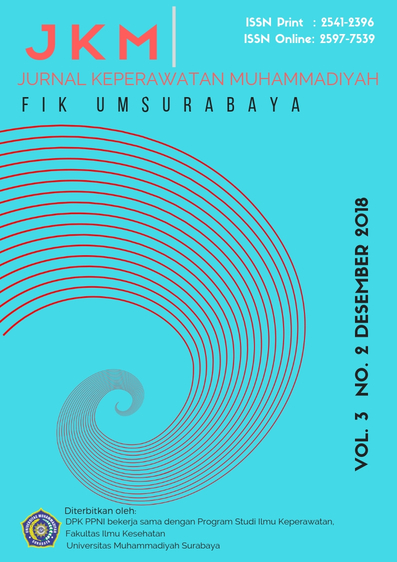Effect of Developmental Care to Decrease Stress Hospitalization in Low Birth Weight Baby in NICU
DOI:
https://doi.org/10.30651/jkm.v3i2.2425Keywords:
Hospitalization Stress, Development Care, Low Birth WeightAbstract
Stress hospitalization is often experienced by low birth weight (LBW) infants who are experiencing nurses in the hospital. Developmental care is one developmental care developed in order to minimize the impact of hospitalization. This study aims to deter- mine the effect of developmental care on hospitalization stress reduction among LBW infants in NICU Dr. Moh Soewandhi Hospital. Pre-experimental Design One Group Pre-Post Test Design was used. 30 respondents obtained by using Simple Random Sampling technique. The independent variable was development care and the depen- dent variable was stress hospitalization. Developmental care procedure checklist and the behavior sheet of LBW infant instrument were used. The data was analyzed using Wilcoxon Signed Rank Test with significance level α = 0.05. The results showed that almost half (46.7%) of respondents had moderate stress before Development Care was done, and most of them (73.3%) did not experience stress after Development Care. The Wilcoxon Signed Rank Test analysis showed that p = 0,000 at significance level α = 0.05. It means that there is influence of developmental care to decrease stress of hospi- talization on LBW Infant in NICU Dr Moh Soewandhi Hospital. In sum, develop- ment Care can reduce hospitalization stress in LBW. Therefore, it is suggested that the whole family to do Development Care on LBW who experience stress hospitalization.
References
Arikunto, S 2006, Prosedur Penelitian Suatu Pendekatan Praktis, Rineka Cipta, Jakarta
Bobak,I.M., Lowdermilk,D.L., & Jensen,M.D. 2010. Buku Ajar Keperawatan Maternitas. Edisi 4. Jakarta : EGC
Depkes RI. 2004. Pelayanan Kesehatan Neonatal Esensial. Depkes RI. Jakarta
Depkes RI. 2006. Pedoman Pelaksanaan Stimulasi, Deteksi, dan Intervensi Dini Tumbuh Kembang Anak Di Tingkat Pelayanan Kesehatan Dasar. Jakarta : Dirjrn Bina Kesehatan Masyarakat – Depkes RI.
Ganong,W.F. 2009. Buku Ajar Fisiologi Kedokteran. Edisi 22. Jakarta : EGC
Hidayat, A.A.A 2010, Metode Penelitian Kesehatan Paradigma Kuantitatif, Salemba Medika, Jakarta
Hidayat, A.A.A. 2005. Pengantar Ilmu Keperawatan Anak 1, Edisi Pertama, Jakarta : Salemba Medika.
Hidayati, Ratna, dkk. 2014. Praktik Laboratorium Keperawatan Jilid 2. Jakarta : Penerbit Erlangga
Kemenkes, 2008, Riset Kesehatan Dasar 2007, Badan Penelitian dan Pengembangan Kesehatan Departemen Kesehatan, Jakarta
Kosim, MS, dkk. 2008. Buku Panduan Managemen Masalah Bayi Baru Lahir Untuk Dokter, Bidan dan Perawat Di Rumah Sakit. IDAI, MNH-JHPIEGO-Depkes RI, Jakarta
Maguire,C.M.,Walther,F.J.,Zwieten,P.H.,Le Cessie,S.,Wit,J.M.,&Veen,S. 2008. Effects Of Basic Developmental Care On Neonatal Morbidity, Neuromotor Development, And Growth At Term Age Of Infant Who Were Born At < 32 Weeks. Pediatrics, 121, 239 – 245, diunduh pada tanggal 12 Oktober 2014 dari www.pediatrics.org.
Mellenium Development Goals (MDGs). 2008. Diunduh pada tanggal 12 Oktober 2014 dari http://www.undp.or.id
Nursalam 2008, Konsep dan Penerapan Metodologi Penelitian Ilmu Keperawatan, Salemba Medika, Jakarta
Nursalam. 2008. Konsep dan Penerapan Metodologi Penelitian Ilmu Keperawatan Pedoman Skripsi, Tesis, dan Instrumen Penelitian Keperawatan. Edisi 2. Jakarta: Salemba Medika
Riset Kesehatan Dasar Nasional 2007. Jakarta : Badan Penelitian Dan Pengembangan Kesehatan Depkes RI. Diunduh tanggal 16 Februari 2011 dari www.kesehatan.kebumenkab.go.id/data/lapriskesdas.pdf
Wong.,D.L, Hockenberry. 2009. Buku Ajar Keperawatan Pediatrik. Jakarta : EGC
Downloads
Published
Issue
Section
License
- Penulis tetap memegang hak atas karyanya dan memberikan hak publikasi pertama kepada jurnal ini yang secara simultan karya tersebut dilisensikan di bawah:Â Creative Commons Attribution-ShareAlike 4.0 International (CC BY-SA 4.0)













